Jill Robinson: The hurt, the horror and happiness of rescuing bears
27 October 2016
On the cruelty of bile farms, her pride at the rescuing 600 bears and the incredible animal lovers helping her end bear bile farming.
Q. When you first set foot on a bile farm in 1993, did you ever imagine that one day Animals Asia would run sanctuaries in China and Vietnam?
Not at all. At the time, my head was spinning, my heart was breaking and all I could focus on was the desolate eyes of one bear. I left the farm just knowing something had to be done.
I realised that I urgently needed to understand the mechanics of an industry responsible for so much suffering and pain.
I found out all I could and was elated to hear from traditional medicine doctors that herbal and synthetic substitutes were already widely available. It was clear this industry was completely unnecessary.
The sanctuary idea came later after gaining the trust with the authorities. I also realised that by being able to examine bears we could prove the hideous abuse behind the industry.
When we were allowed to rescue some bears, we didn't hesitate – they were removed from cruelty and pain and we had the evidence. We had animals that could metaphorically "speak" about the reality of the trade, and what it had done to them.
Q. Of all harrowing rescues, which has affected you the most?
Kiki (pictured below) – I’ll never forget Kiki. In 2008 we rescued him in an appalling condition. We offered him orange juice and he fell on the jug trying to quench his thirst. Seconds later he was frantically pawing at his mouth. It was only when we got him on the surgery table and opened his mouth that we saw virtually every one of his teeth was shattered. He had broken them all frantically biting the iron bars of his cage in a futile attempt to escape. His jaw was broken too. The acidity of the juice must have burned his fractured mouth terribly.
There was worse to come from the health check. Kiki had infection running through his entire body as a result of the surgical mutilation conducted to create the free-drip fistula in his abdomen.
The infection had spread everywhere, even causing pus in his eyes which blinded him. His intestines were grossly swollen, his footpads were horribly cracked and sore, and pustulating wounds covered his body.
Just as our incredible veterinary team were wondering where to begin to mend this "broken bear", Kiki made the decision for us and died on the surgery table. He had probably longed for that release for many years.
Q. Thankfully, for hundreds of bears, rescues have signalled the beginning of a new life, what's been the greatest happy ending for a bear that you have seen?
It has to be Oliver (pictured below). He was another beautiful broken bear that we feared would never survive. He needed major abdominal surgery on the roadside during his rescue but spectacularly endured and lived with us for four long happy years.
Not a single person would look at Oliver and not cry at his story. For thirty years he rotted in a cage, wearing a "full metal jacket" on a bear bile farm in Shandong. The abuse twisted his body, but it didn’t break his spirit.
Those four years of seeing him plodding around his enclosure, dipping in the pool, and lying nose-deep in clover are some of the happiest memories I have.
We still remember him every year on Oliver’s Day, November 12. He really is the greatest symbol of the cruelty of bear bile farming and our capacity to set it right.
Bears like Oliver are the foundation on which our sanctuaries are built. Their individual characters are what engage us to their plight and to their indomitable spirits, and forgiving natures.
Q. More than 600 bears have now been rescued in Vietnam and China. When you first set up the sanctuaries did you even know that it could be done? Had anyone anywhere ever integrated that many bears before?
My father always said, "don't tell me how you can't do a thing, tell me how you can." I've always carried that tenacity and that fire to never give up.
No-one had ever integrated such a large number of bears from such bleak backgrounds. We sought advice from every bear expert we could find, and learned from experience too.
The sanctuaries today are built on good protocols, a steep learning curve and always the bears’ welfare comes first. Both sanctuaries have since been awarded the Global Federation of Sanctuaries awards. I couldn't be more proud.
Q. You have a room at the China Bear Rescue Centre where you stay regularly, what is life like at the sanctuary?
A “typical day" is not a phrase we use, ever. With bears on the health check table we often see sad surprises.
Earlier this year Jasper came in for an exploratory health check and was sadly euthanised, post mortemed, and buried the same day after liver cancer was found.
Such experiences are horribly sad for everyone. To lose a bear that has been with us for so many years never ceases to be anything but pure heartbreak.
But to be around so many charismatic, happy bears makes our sanctuaries the best workplace in the world, bar none. Life is beautiful here.
Q. Each rescue represents a massive commitment in terms of the future care of each bear for decades ahead. Does it keep you awake at night?
Sometimes yes, but then the eternal optimist in me kicks in when I think how far we’ve come in the 23 years since meeting that first bear in Zhuhai. I believe resolutely that everything will be ok.
We have the best supporters in the world and so many of them have become personal friends. They are as loyal and passionate as the staff who rescue and care for the bears – and their contribution in terms of fundraising is just as important.
The lifespan of our bears is around 30 years. We’ve worked hard to explain that and thankfully there are amazing people who stand up and join us in making a long-term commitment. They understand our duty of care, and that these bears are victims of the most unimaginable abuse. They deserve everything we can give them and more.
Q. Do you think we can end bear bile farming? Are we getting closer?
I wouldn't be doing this today if I didn't honestly believe that we could. We see progress everyday and that keeps us going.
In Vietnam we're now actually using the phrase "end game" in discussions with government in Hanoi. That is enormously satisfying. We’ve been working in the country since 1999 and during that time we have become closer and closer to the authorities at local and national level as well as Forestry officials. They assist us in identifying bears that can be rescued and pressurising owners into giving them up.
When we were pushing for the Halong Bay bears to be rescued it was the Prime Minister himself who stepped in and said it must happen – not just the bears we were pushing for, but the whole province of bile farm bears. Just amazing.
In China, because the industry is still legal, it will take more time, but I'm buoyed by the fact that surveys increasingly show such a huge percentage of people oppose the trade.
Our Nanning project (pictured above) was groundbreaking in the fact that it was a bear farmer wanting to get out of the trade and coming to us for a way to make that happen. Elsewhere we see vast pharmaceutical company KaiBao also wanting to get out.
It’s currently the largest buyer of “raw” bile and they’re investing in a synthetic copy of bear bile – not just the active ingredient, UDCA The fact that the government are also investing suggests there is little desire in China for bear bile farming to continue long-term.
If KaiBao stops buying, then the market is severely affected, and there’s every chance it becomes no longer sustainable to farm bears in this way. It’s a glimpse of a future we’re working towards and when farming ends we’ll make sure we’re leading the efforts to help the bears – just as we are in Vietnam.
Q. What do you think the next 10 years hold for Animals Asia?
I believe bear farming will have ended in Vietnam with new sanctuaries and partners able to take in the remaining bears.
By then it would be hard to imagine much of a market left for bear bile in China. The industry will then need winding down in a way that works for the bears – but also for the farmers. For this to happen as quickly as possible it needs to be win-win.
I also want to see animal performances ended in zoos across Asia – and more zoos operating as rescue centres with the welfare of the animals coming first.
Hopefully, China will have its first animal welfare law before then and the cat and dog meat trade must surely end. There is so much criminally attached to the dog meat trade that it has increasingly few friends.
Sharing your life with a dog or cat makes you begin to think differently about other animals too. In China I believe that banning the eating of cats and dogs can be the first step towards acknowledging the concept of "one life", and extending our compassion to the treatment of all food animals.
Jill Robinson MBE is Animals Asia’s founder and CEO
BACK
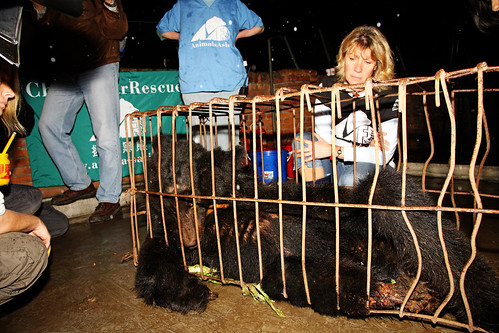
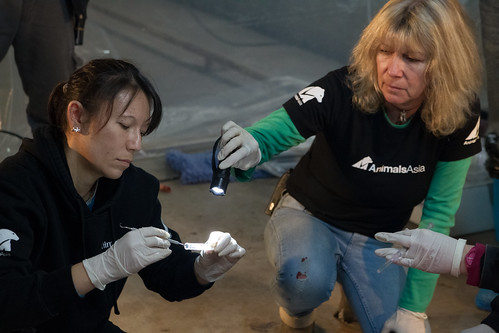
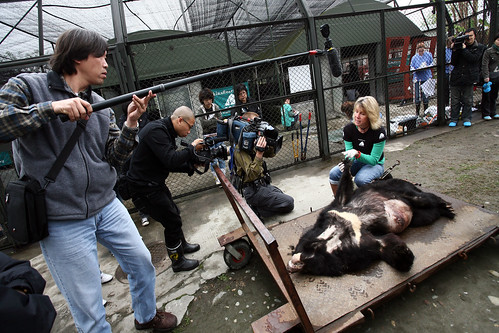
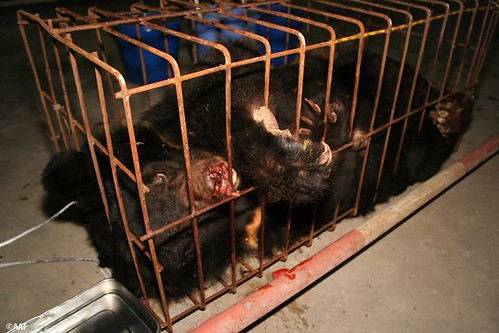
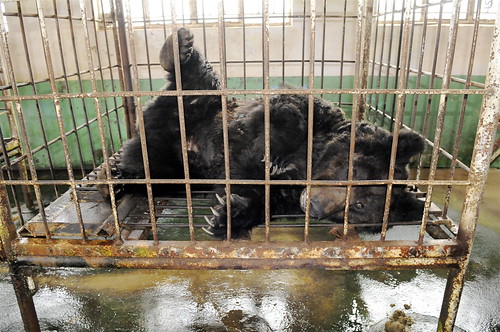
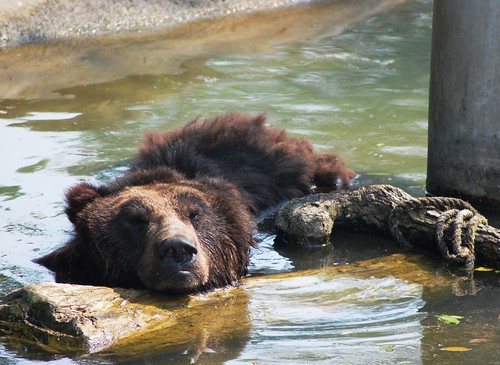
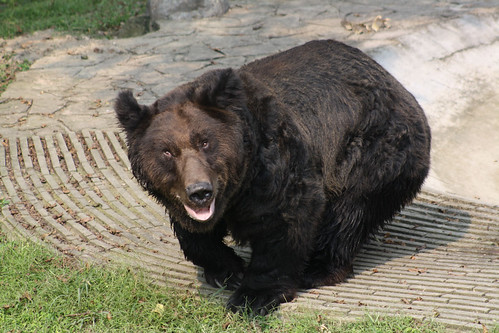

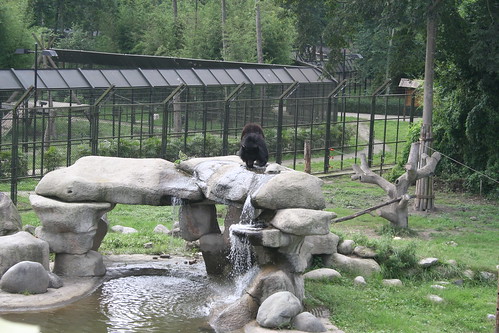
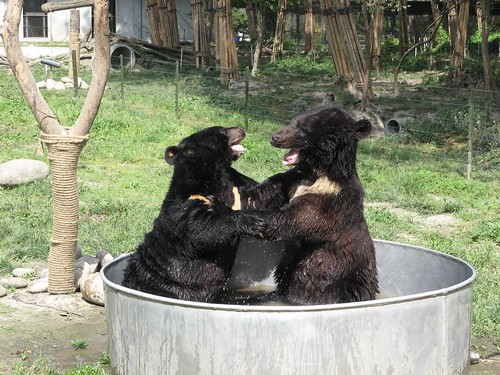

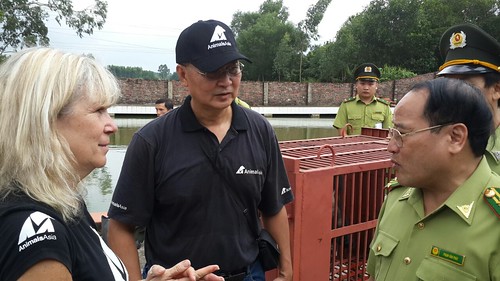
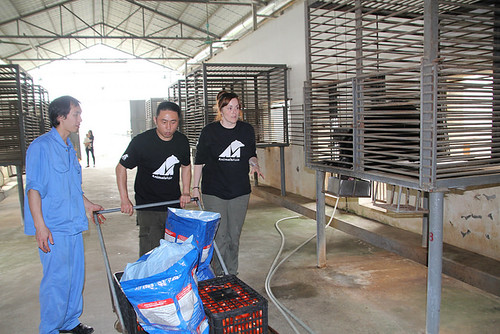
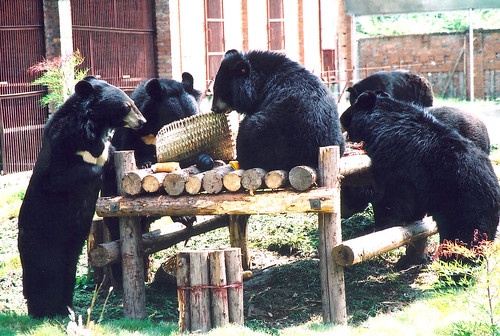




 Freedom after two decades: Moon bears Nang and Mua rescued
Freedom after two decades: Moon bears Nang and Mua rescued
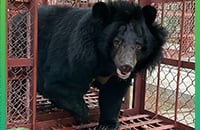 With heavy hearts we say goodbye to our beloved Tulip
With heavy hearts we say goodbye to our beloved Tulip
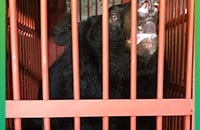 Three moon bears rescued from notorious bear bile farming hotspots in Vietnam
Three moon bears rescued from notorious bear bile farming hotspots in Vietnam